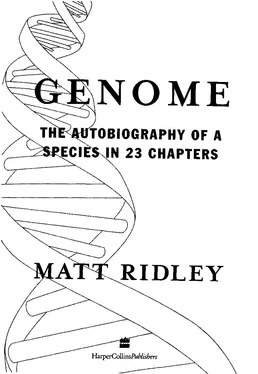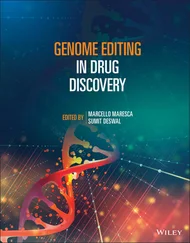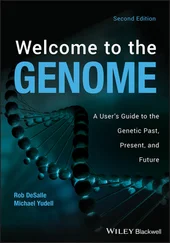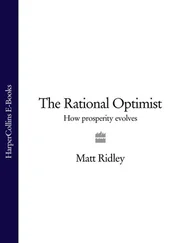Genome - Matt Ridley
Здесь есть возможность читать онлайн «Genome - Matt Ridley» — ознакомительный отрывок электронной книги совершенно бесплатно, а после прочтения отрывка купить полную версию. В некоторых случаях можно слушать аудио, скачать через торрент в формате fb2 и присутствует краткое содержание. Жанр: Старинная литература, на английском языке. Описание произведения, (предисловие) а так же отзывы посетителей доступны на портале библиотеки ЛибКат.
- Название:Matt Ridley
- Автор:
- Жанр:
- Год:неизвестен
- ISBN:нет данных
- Рейтинг книги:5 / 5. Голосов: 1
-
Избранное:Добавить в избранное
- Отзывы:
-
Ваша оценка:
- 100
- 1
- 2
- 3
- 4
- 5
Matt Ridley: краткое содержание, описание и аннотация
Предлагаем к чтению аннотацию, описание, краткое содержание или предисловие (зависит от того, что написал сам автор книги «Matt Ridley»). Если вы не нашли необходимую информацию о книге — напишите в комментариях, мы постараемся отыскать её.
Matt Ridley — читать онлайн ознакомительный отрывок
Ниже представлен текст книги, разбитый по страницам. Система сохранения места последней прочитанной страницы, позволяет с удобством читать онлайн бесплатно книгу «Matt Ridley», без необходимости каждый раз заново искать на чём Вы остановились. Поставьте закладку, и сможете в любой момент перейти на страницу, на которой закончили чтение.
Интервал:
Закладка:
So even determinists can escape determinism. We have a paradox.
Unless our behaviour is random, then it is determined. If it is determined, then it is not free. And yet we feel, and demonstrably are, free. Charles Darwin described free will as a delusion caused by our inability to analyse our own motives. Modern Darwinists such as Robert Trivers have even argued that deceiving ourselves about such matters is itself an evolved adaptation. Pinker has called free will 'an idealisation of human beings that makes the ethics game F R E E W I L L 3 1 1
playable'. The writer Rita Carter calls it an illusion hard-wired into the mind. The philosopher Tony Ingram calls free will something that we assume other people have — we seem to have an inbuilt bias to ascribe free will to everybody and everything about us, from recalcitrant outboard motors to recalcitrant children equipped with our genes.7
I would like to think that we can get a little closer to resolving the paradox than that. Recall that, when discussing chromosome 10, I described how the stress response consists of genes at the whim of the social environment, not vice versa. If genes can affect behaviour and behaviour can affect genes, then the causality is circular. And in a system of circular feedbacks, hugely unpredictable results can follow from simple deterministic processes.
This kind of notion goes under the name of chaos theory. Much as I hate to admit it, the physicists have got there first. Pierre-Simon de LaPlace, the great French mathematician of the eighteenth century, once mused that if, as a good Newtonian, he could know the positions and the motions of every atom in the universe, he could predict the future. Or rather, he suspected that he could not know the future, but he wondered why not. It is fashionable to say that the answer lies at the subatomic level, where we now know that there are quantum-mechanical events that are only statistically predictable and the world is not made of Newtonian billiard balls. But that is not much help because Newtonian physics is actually a pretty good description of events at the scale at which we live and nobody seriously believes that we rely, for our free will, on the probabilistic scaffolding of Heisenberg's uncertainty principle. To put the reason bluntly: in deciding to write this chapter this afternoon, my brain did not play dice. To act randomly is not the same thing as to act freely — in fact, quite the reverse.8
Chaos theory provides a better answer to LaPlace. Unlike quantum physics, it does not rest on chance. Chaotic systems, as defined by mathematicians, are determined, not random. But the theory holds that even if you know all the determining factors in a system, you may not be able to predict the course it will take, because of the 3 1 2 G E N O M E
way different causes can interact with each other. Even simply determined systems can behave chaotically. They do so partly because of reflexivity, whereby one action affects the starting conditions of the next action, so small effects become larger causes. The trajectory of the stock market index, the future of the weather and the 'fractal geometry' of a coastline are all chaotic systems: in each case, the broad outline or course of events is predictable, but the precise details are not. We know it will be colder in winter than summer, but we cannot tell whether it will snow next Christmas Day.
Human behaviour shares these characteristics. Stress can alter the expression of genes, which can affect the response to stress and so on. Human behaviour is therefore unpredictable in the short term, but broadly predictable in the long term. Thus at any instant in the day, I can choose not to consume a meal. I am free not to eat. But over the course of the day it is almost a certainty that I will eat.
The timing of my meal may depend on many things — my hunger (partly dictated by my genes), the weather (chaotically determined by myriad external factors), or somebody else's decision to ask me out to lunch (he being a deterministic being over whom I have no control). This interaction of genetic and external influences makes my behaviour unpredictable, but not undetermined. In the gap between those words lies freedom.
We can never escape from determinism, but we can make a distinction between good determinisms and bad ones - free ones and unfree ones. Suppose that I am sitting in the laboratory of Shin Shimojo at the California Institute of Technology and he is at this very moment prodding with an electrode a part of my brain somewhere close to the anterior cingulate sulcus. Since the control of
'voluntary' movement is in this general area, he might be responsible for me making a movement that would, to me, have all the appearance of volition. Asked why I had moved my arm, I would almost certainly reply with conviction that it was a voluntary decision.
Professor Shimojo would know better (I hasten to add that this is still a thought experiment suggested to me by Shimojo, not a real one). It was not the fact that my movement was determined that F R E E W I L L 313
contradicted my illusion of freedom; it was the fact that it was determined from outside by somebody else.
The philosopher A. J. Ayer put it this way:9
If I suffered from a compulsive neurosis, so that I got up and walked across the room, whether I wanted to or not, or if I did so because somebody else compelled me, then I should not be acting freely. But if I do it now, I shall be acting freely, just because these conditions do not obtain; and the fact that my action may nevertheless have a cause is, from this point of view, irrelevant.
A psychologist of twins, Lyndon Eaves, has made a similar point:10
Freedom is the ability to stand up and transcend the limitations of the environment. That capacity is something that natural selection has placed in us, because it's adaptive . . . If you're going to be pushed around, would you rather be pushed around by your environment, which is not you, or by your genes, which in some sense is who you are.
Freedom lies in expressing your own determinism, not somebody else's. It is not the determinism that makes a difference, but the ownership. If freedom is what we prefer, then it is preferable to be determined by forces that originate in ourselves and not in others.
Part of our revulsion at cloning originates in the fear that what is uniquely ours could be shared by another. The single-minded obsession of the genes to do the determining in their own body is our strongest bulwark against loss of freedom to external causes. Do you begin to see why I facetiously flirted with the idea of a gene for free will? A gene for free will would not be such a paradox because it would locate the source of our behaviour inside us, where others cannot get at it. Of course, there is no single gene, but instead there is something infinitely more uplifting and magnificent: a whole human nature, flexibly preordained in our chromosomes and idio-syncratic to each of us. Everybody has a unique and different, endogenous nature. A self.
B I B L I O G R A P H Y A N D
N O T E S
The literature of genetics and molecular biology is gargantuan and out of date. As it is published, each book, article or scientific paper requires updat-ing or revising, so fast is new knowledge being minted (the same applies to my book). So many scientists are now working in the field that it is almost impossible even for many of them to keep up with each other's work. When writing this book, I found that frequent trips to the library and conversations with scientists were not enough. The new way to keep abreast was to surf the Net.
The best repository of genetic knowledge is found at Victor McCusick's incomparable website known as OMIM, for Online Mendelian Inheritance in Man. Found at http://www.ncbi.nlm.gov/omim/, it includes a separate essay with sources on every human gene that has been mapped or sequenced, and it is updated very regularly — an almost overwhelming task. The Weizmann Institute in Israel has another excellent website with 'gene-cards'
Читать дальшеИнтервал:
Закладка:
Похожие книги на «Matt Ridley»
Представляем Вашему вниманию похожие книги на «Matt Ridley» списком для выбора. Мы отобрали схожую по названию и смыслу литературу в надежде предоставить читателям больше вариантов отыскать новые, интересные, ещё непрочитанные произведения.
Обсуждение, отзывы о книге «Matt Ridley» и просто собственные мнения читателей. Оставьте ваши комментарии, напишите, что Вы думаете о произведении, его смысле или главных героях. Укажите что конкретно понравилось, а что нет, и почему Вы так считаете.












